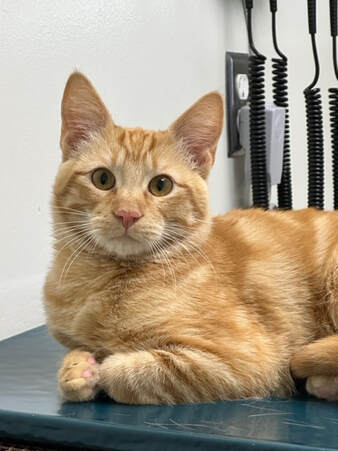Wellness Checkups

Yearly or twice-yearly visits to the vet can help your cat stay happy and healthy in a number of ways. Cats are particularly skilled at hiding an illness or discomfort, so routine visits to the vet can help expose any medical conditions your cat may be hiding. Catching these conditions early has numerous benefits, such as more treatment options, a better prognosis, lower vet bills, and increased comfort and quality of life for your cat. Similarly, regular vet visits can help prevent emergency situations from occurring, which are often expensive, painful, and sometimes fatal.
Routine examinations with your vet are also a good time to discuss any behavioral or personality changes in your cat, which could be the result of an underlying medical condition. If you cat is not using her litter box, acting aggressive, or having other behavioral issues, there’s a strong chance it’s because of pain, stress, or an undiagnosed medical condition. Your vet can help you determine the underlying cause of these changes and provide the best treatment/solutions moving forward.
Finally, vet check-ups are a good time to talk about the safety and effectiveness of your cat’s flea and parasite prevention plan. Even if your cat is indoors only, she should still be taking regular parasite preventative medication. Parasites such as fleas, intestinal worms, ear mites, and heartworms can still be contracted by indoor cats. Your vet can help determine the safest and most effective parasite prevention and treatment program.
References
“How Often Should You Take Your Cat to the Vet?” Cole & Marmalade, 27 Apr. 2019, coleandmarmalade.com/2018/06/18/how-often-should-you-take-your-cat-to-the-vet/.
Routine examinations with your vet are also a good time to discuss any behavioral or personality changes in your cat, which could be the result of an underlying medical condition. If you cat is not using her litter box, acting aggressive, or having other behavioral issues, there’s a strong chance it’s because of pain, stress, or an undiagnosed medical condition. Your vet can help you determine the underlying cause of these changes and provide the best treatment/solutions moving forward.
Finally, vet check-ups are a good time to talk about the safety and effectiveness of your cat’s flea and parasite prevention plan. Even if your cat is indoors only, she should still be taking regular parasite preventative medication. Parasites such as fleas, intestinal worms, ear mites, and heartworms can still be contracted by indoor cats. Your vet can help determine the safest and most effective parasite prevention and treatment program.
References
“How Often Should You Take Your Cat to the Vet?” Cole & Marmalade, 27 Apr. 2019, coleandmarmalade.com/2018/06/18/how-often-should-you-take-your-cat-to-the-vet/.